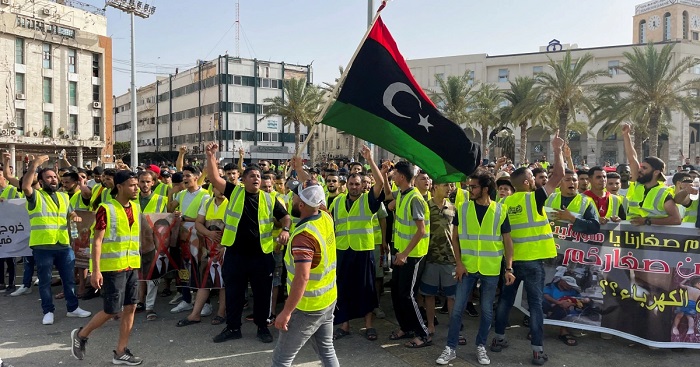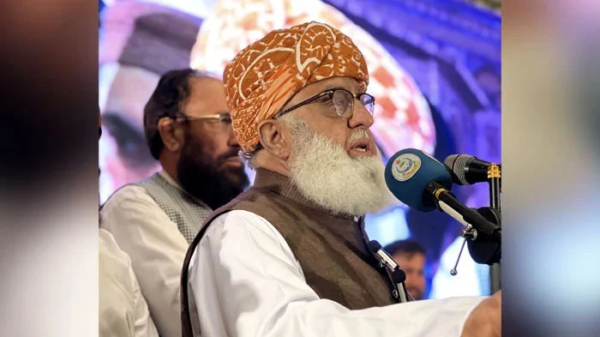The House of Representatives in the eastern city of Tobruk was burned down on Friday, while hundreds of protestors in the capital city of Tripoli have descended on the city center to criticize armed militias and rising costs of essential necessities.
Protests have broken out after members from Tripoli’s High Council of State and Tobruk’s House of Representatives, in discussions brokered by the United Nations in Cairo and Geneva, have failed to reach an agreement on a constitutional framework and path to elections.
An oil embargo instituted by groups attempting to oust the internationally recognized government in Tripoli and replace it with one led by former Interior Minister Fathi Bashagha.
There are many different motivations for the demonstrators to go to the streets. But they can be summed up in one sentence: “the politicians’ refusal to establish a political settlement and their inclination instead to struggle with each other over power at the expense of regular residents,” said a Libyan professor and writer, Ahmed Mayouf, to Al Jazeera.
Even people who don’t care much about politics will feel the effects of this failure because of the general decline in quality of life.
A Libyan journalist, Mustafa Fetouri, echoed this sentiment, saying, “the protests are against the present status quo in its totality, and that includes both administrations; [interim Prime Minister Abdul Hamid] Dbeibah’s in Tripoli and Bashagha’s in Sirte.”
According to Al Jazeera, Fetouri said, “the fundamental cause for the demonstrations is the deterioration of living circumstances in Libya, and in particular the continual power interruptions, lack of work possibilities, and the absence of any agreement on elections.”
Nonetheless, Yusuf Bakhbakhi, a Libyan researcher living in Tripoli, has claimed that the demonstrations’ causes vary by region.
Protests against Dbeibah’s administration have been fueled by “a sense of discontent and mounting concerns over issues relating to unemployment” in Tripoli, he claimed.
Elections have not been held in Tobruk for “more political reasons” related to the presence of mercenaries and the politics of the House of Representatives.
“THE PROTEST MAY ESCALATE”
Since Muammar Gaddafi’s overthrow in 2011, Libya has been plagued by instability and civil war.
A new administration under Dbeibah’s leadership was formed in 2021 after a national conversation supported by the United Nations led to the promise of elections in December of that year. The legitimacy of Dbeibah’s government is in question, however, because elections were postponed indefinitely.
The House of Representatives in Tobruk appointed Bashagha as prime minister and gave him the controversial task of forming a government in February 2022, with the support of strongman Khalifa Haftar, who had besieged the capital Tripoli throughout 2019 before being driven back by Turkey’s military intervention.
When Bashagha tried to visit Tripoli in May to form his administration, he was greeted with fierce opposition from armed militias affiliated with Dbeibah. He eventually announced that he would manage the country from Sirte.
Over the last few months, supporters of Bashagha’s administration have partially shut down oil facilities in the east in an effort to force Dbeibah’s government to resign. Bashagha told Reuters that if the central bank provided the cash for the budget that parliament had authorized, the oil blockade would likely end.
One of the main complaints of the latest demonstrators in the streets of Libya is the widespread blackouts that have arisen as a result of the oil blockade.
Tripoli-based Yusuf Bakhbakhi, a Libyan professor, told Al Jazeera that “power outages are lasting for hours during the day, and waits at gas stations are unusually long.” This is in addition to the already-present price increases and inflation.
However, Bakhbakhi claimed that the demonstrations had not yet reached a critical mass to potentially affect change.
The level of demonstrations may rise. Certainly, he answered, there’s room for this option.
Bakhbakhi continued, “Despite the deteriorating living circumstances, Libyans at the present are still not at the point whereby they are ready to take to the streets in big numbers.”
The demonstrations, according to Mayouf, will certainly get worse.










